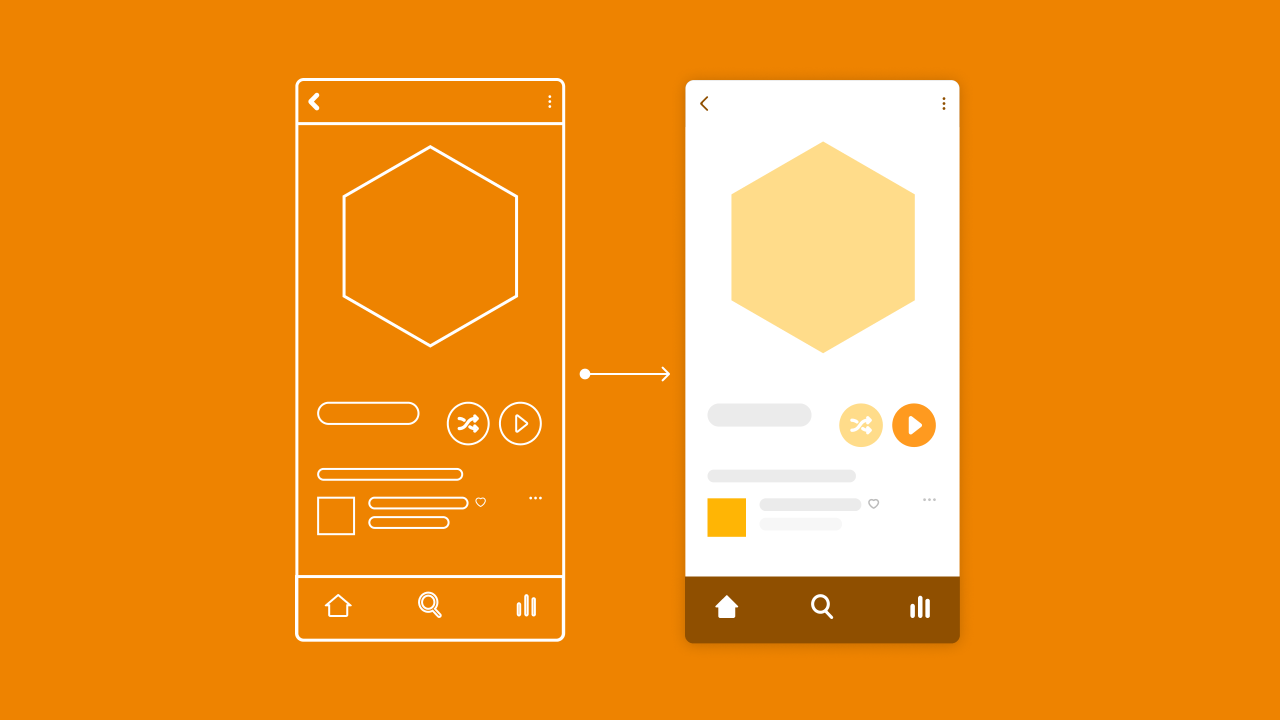This is one of the big questions when it comes to developing your digital visibility: should you opt for a mobile-friendly website, or create a dedicated application ? The choice between these two options is based on a number of factors and investments that can tip the decision one way or the other.
However, as is often the case in marketing and communications, the situation is never completely black and white. While a application mobile site can offer certain advantages, a responsive website can present other assets. The decision depends on the context, the target market, the consumers and the company's overall strategy.
Let's take a closer look at these distinctions to help you navigate these choices and select the best digital option for your needs.

The main differences between a mobile application and a responsive website
Between these 2 "solutions to your digital visibility challenges", there are several important differences.
Accessibility
While a website can be consulted directly via a browser such as Google, the use of a application mobile application requires prior download.
This can make it less convenient to access, especially as it can't be used on a computer unless it's specifically designed for it. As for the website, even if it's not specifically adapted for mobiles, it's still accessible on a smartphone, even if this may compromise the quality of the browsing experience.
Integration into everyday life
The advantage of a application mobileis that it can easily become part of the user's daily routine, connecting seamlessly with other functions such as messaging, email and GPS. A website, even if it can access some of these functions, does not fit as naturally into the daily use of a smartphone. Applications encourage constant interaction, notably through notifications that keep users interested.
Maintenance and back-office
Maintenance and back-end management (back-office) depend largely on the development method chosen for your site or application.
It's generally accepted that website updates are easier to implement, largely because they don't require the user to download an update, as is the case with application. However, apps, being native, are unlikely to disrupt the overall aesthetic, unlike mobile websites, which are often adapted versions of desktop sites and can run into fit problems.
On the other hand, the lifespan of a application is shorter than that of a website, notably due to the differences in functionality and end-use between the two.

The price
The question of creative cost is always a complex one to address, due to the variability of prices, which are highly dependent on user experience design (UX), web design and technical development requirements.
It's essential to plan for mobile compatibility right from the design phase of a desktop website, adopting a responsive approach. This ensures optimal user experience and effective adaptation on mobile devices. In general, apart from a few adjustments, the cost of making a website mobile-friendly remains moderate.
When it comes to mobile applications, the process is more complex because everything is built from scratch, with specific development required for each operating system. For example, for a application to be available on both iPhone and Samsung, it will be necessary to develop separately for iOS and Android, which can considerably increase costs.
In short, the development of a application mobile tends to be more expensive than the creation of a mobile website, not only because of the complexity of development on different platforms, but also because of the different nature of its use.
Here are 8 significant advantages of mobile applications over mobile websites:
Personalized user experience
Using application mobile makes it easy to create a customized experience for every user. Immediately after installation,application offers the possibility of configuring a personalized profile, adapted to the user's personal preferences, behaviors and objectives.
For example, at application, users can choose when and how they want to be notified, as well as the type of content they prefer to receive.
Mobile users are inclined to spend time personalizing their profile and answering specific questions, improving their overall experience withapplication.
Direct notifications
In the field of digital marketing, mobile notifications are proving to be invaluable tools for occasionally greeting your users and reminding them of your presence.
There are two main categories of notifications. Internal notifications, which are triggered only when the user is actively engaged withapplication. Push notifications, on the other hand, can be received by the user at any time, provided they have previously consented to receive them via theapplication settings.
Both types of notification are valuable marketing resources. However, it's crucial to moderate the frequency with which they are sent, to avoid annoying users.
Mobile-optimized navigation
Mobile applications are developed for mobile use. Compared to a website, the information displayed is sorted out and the most suitable features for mobile use are highlighted through carefully thought-out ergonomics.
When you already have a website and you develop a application mobile, you're not duplicating your website, you're offering a new experience and a new way of using your service.
The advantages of mobile applications over websites Responsive means that mobile applications are designed to offer a fluid, ergonomic user experience.
Improved customer loyalty
Our cell phone is the accessory we keep constantly at our fingertips. In this context, mobile applications prove to be exceptional tools for relationship marketing, since your application logo can appear multiple times on users' screens throughout the day.
What's more, mobile applications are able to provide a much more tailored and personal experience than a website. This personalization plays a key role in retaining users, who are then more inclined to use a application that responds specifically to their preferences and objectives.
Brand visibility
On mobile, we tend to spend much more time on our apps than on the web. We use them every day. Just seeing the application icon on a cell phone acts as a reminder of a brand.
You could almost say that theapplication mobile mini logo functions as a non-aggressive brand advertisement. By opening their phone every day, users are likely to see theapplication icon, and unconsciously memorize it. The brand becomes embedded in their minds.
Phygital strategy
Mobile applications feature functionalities that reinforce the interaction between a company's digital and physical identities. For example, a brand'sapplication can integrate a digital wallet where users keep their points and loyalty cards, which can be used directly in-store via a scan.
Options such as click and collect also link the online experience to the increasingly popular physical purchase. Geolocation enables companies to offer specific promotions to customers close to their stores.
After a purchase, sending notifications to solicit opinions or comments viaapplication mobile is another way of engaging customers. Adopting a phygital approach is advantageous for companies aiming to increase in-store traffic, representing a major asset of mobile applications on the websites.
Exploiting mobile functionalities
As a connected device, the smartphone is equipped with numerous features, including GPS, NFC, compass, camera and microphone.
These features offer a multitude of options for enriching your application mobile, enabling you to offer a distinctive and personalized user experience.
Monetize your application mobile
Creating a application mobile site often presents more monetization opportunities than a website.
Typically, applications offer a freemium package, giving access to certain services free of charge, while full access requires a paid subscription.
Advertising is another revenue stream for mobile applications, particularly games, which frequently use video ads to generate profits. The choice of monetization method essentially depends on the business model adopted byapplication.
Why not consider both?
- Having both a website and a mobile application can be a wise move, as long as you clearly differentiate their uses to avoid redundancy, and assess the cost/benefit ratio of each.
- The two platforms can serve complementary purposes, ensuring a solid online presence while offering an enriched and personalized user experience throughapplication.
Our advice on whether to develop a mobile application or a responsive website
Primarily based on your type of business and the services you offer.
For an online business, it's best to turn to an adaptive website. On the other hand, for a dating service, a mobile application would be more suitable.
Regardless of whether you choose a mobile site or application, don't hesitate to Contact us ! You'll find a team of specialists ready to turn your ideas into reality.


